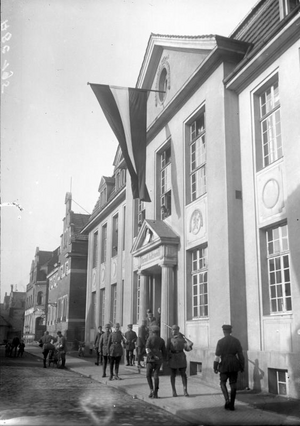Friesienstadt Putsch
| Friesienstadt Putsch | |||||||
|---|---|---|---|---|---|---|---|
 Fascist Steel Cross soldiers at the Friesienstadt Rathaus | |||||||
| |||||||
| Belligerents | |||||||
| |||||||
| Commanders and leaders | |||||||
|
|
| ||||||
| Strength | |||||||
| 3,500+ |
1,560 1 General Treisten class cruiser | ||||||
| Casualties and losses | |||||||
|
250 killed Many captured and imprisoned |
4 killed 25 injured | ||||||
The Friesienstadt Putsch was a failed coup d'état by the fascist Steel Cross party in 1934. The coup was led by Steel Cross leader Erwin R. van Treich and former Englean Imperial Army general Heinz Lutherman, and attempted to overthrow the local Frasian government and install a fascist government headed by the Steel Cross. It was planned that the capture of Friesienstadt would allow the party to gain a "centre hub" that would act as a base of operations for a later march on Engelberg. The Steel Cross paramilitary arm, the Reichsabteilung, was the primary armed force used to capture the city, consisting of more than 3,500 lightly-armed soldiers. On the 25th of June, General Reinhold Ferdinand von Schröpfer was ordered to assist the local Landwehr forces and suppress the revolt. In addition, the Imperial Navy heavy cruiser SMS Freiherr Dennewitz was dispatched to provide force-projection near the city to support any possible dialogue between the Imperial Army and the Steel Cross. On the 27th of June General von Schröpfer's troops routed the insurgents, forcing their retreat to the outskirts of the city, and on the 29th, their full retreat. This failed coup would lead to the Steel Cross requesting support from neighbouring Rezua for assistance in their attempts to gain power, eventually culminating in the founding of the Frasian Federation in 1936.